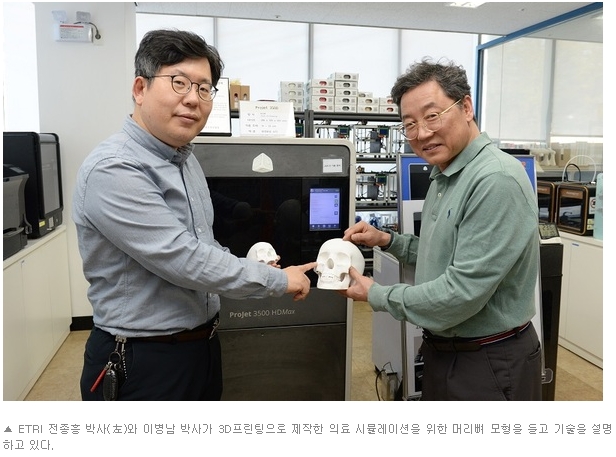본문
South Korean researchers are developing international standards that can create customized medical devices for each patient using artificial intelligence (AI) and 3D printing technologies.
The Korea Electronics and Telecommunications Research Institute (ETRI) announced on the 28th that two new international standardizations on "medical image-based medical 3D printing modeling" were finally approved on the 25th of last month.
The adopted standardization items included requirements for the manufacture of medical 3D printer prostheses based on CT images and ophthalmic images, and the division procedure for each human tissue required in the manufacturing process.
Until now, in order to prepare medical equipment suitable for the patient's condition, it was necessary to create a printing model through manual work. This is because it is not easy to clearly distinguish the tissue parts in the video. It took a long time to produce, making it difficult to use data from other medical staff because there were many restrictions in urgent situations and there were no standards.
Since 2018, a joint research team composed of Professor Shim Kyu-won of Yonsei University and Professor Hong Helen of Seoul Women's University, led by ETRI Jeon Jong-hong, has started to develop standards for ways to automate the process of creating 3D printing models through deep learning. In particular, it also includes a technology that automates the most important segmentation process in creating a specific human tissue model from medical images based on artificial intelligence.
Experts from the U.S. FDA, the North American Society of Imaging (RSNA), and DICOM will also participate in the standardization work proposed and developed by the research team, which is expected to have a great impact on medical and related industries.
In particular, the researchers developed more than 500 sets of CT medical image learning/experimental data in the orbital bone region for standard development and verification, and published the results of artificial intelligence-based split experiments in more than five international conference papers.
In addition, ETRI has been striving to establish a committee that can lead the international standardization of 3D printing and scanning since 2015 based on research experiences such as developing authoring/editing tools for 3D scanning and 3D printing, and developing 3D printing technologies for bio/electronic devices. Through this, the Working Group (WG) 12, which approved this standardization item, was newly established in August 2018, and is leading the international standardization of the medical field by cooperating with domestic and foreign experts.
The research team plans to create additional international standards to enable precise automatic modeling without distortion and loss by applying deep learning technology to "3D reconstruction" and "3D format conversion" in the future.
Dr. Lee Byung-nam of ETRI, chairman of the International Standard Working Group (WG12), said, "To accelerate the development of international standards for medical 3D printing, we will further strengthen cooperation with related international standardization organizations such as dentistry, orthopedic surgery, medical artificial intelligence, and medical imaging."



